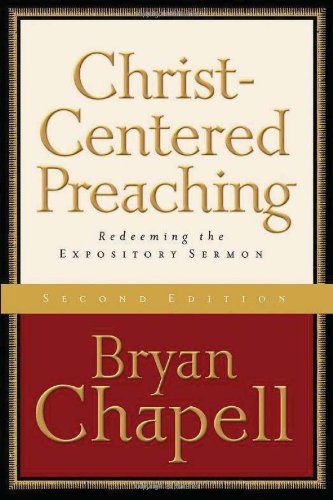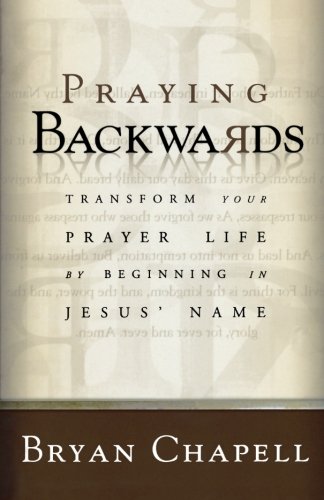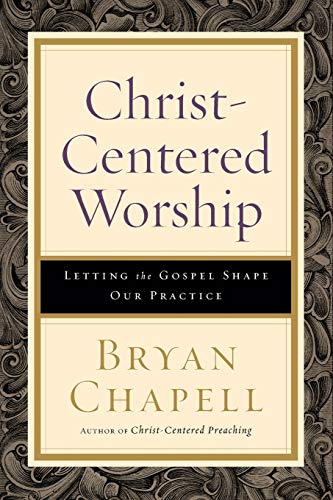
Quotes by Bryan Chapell
There is a proper role for what theologians call subjective guilt (how I feel). This feeling of remorse for wrong is a result of the Holy Spirit revealing our sin to our consciences (this we call “conviction”). However, amid our feelings of remorse we must remember that our objective guilt (the judgment that God imposes for our sin) has been entirely satisfied by Christ (Eph. 2:14-16; Col. 1:19-20).
The Power of Mercy by Bryan Chapell taken from Holiness by Grace by Bryan Chapell, copyright 2001, Crossway Books, a division of Good News Publishers, Wheaton Illinois 60187, www.crosswaybooks.org. Page 189.
All of this longing for guilt comes from the conviction that, if we will make ourselves feel bad enough and carrying a burden of remorse long enough, we will merit God’s grace. But who really wants us pressed down and paralyzed by a burden of guilt? Satan. He is our accuser (see Rev.12:10). Nothing pleases him more than for Christians to beat themselves down into paralyzing depression or unproductive despair. The Bible does not say our guilty feelings or compensating recriminations will make us right with God. God makes us right with God. He does not want us bowed down in despair. He is the lifter of our heads (Ps. 3:3).
The Power of Mercy by Bryan Chapell taken from Holiness by Grace by Bryan Chapell, copyright 2001, Crossway Books, a division of Good News Publishers, Wheaton Illinois 60187, www.crosswaybooks.org. Page 191.|The Power of Mercy by Bryan Chapell taken from Holiness by Grace by Bryan Chapell, copyright 2001, Crossway Books, a division of Good News Publishers, Wheaton Illinois 60187, www.crosswaybooks.org. Page 191.
God doesn’t want us to punish ourselves to erase our guilt. He punished his Son to cancel our guilt. God will not build His kingdom on our pain because He is building it on His mercy.
The Power of Mercy by Bryan Chapell taken from Holiness by Grace by Bryan Chapell, copyright 2001, Crossway Books, a division of Good News Publishers, Wheaton Illinois 60187, www.crosswaybooks.org. Page 192.
Remorse for sin does have a place in the Christian life, but we should be very sure what function it serves. Guilt should drive us to the cross, but grace must lead us from it. Guilt makes us seek Christ, but gratitude should make us serve Him. Guilt should lead to confession, but without a response of love as the motive of renewed obedience, true repentance never matures.
The Power of Mercy by Bryan Chapell taken from Holiness by Grace by Bryan Chapell, copyright 2001, Crossway Books, a division of Good News Publishers, Wheaton Illinois 60187, www.crosswaybooks.org. Page 192.
Remorse prior to approaching the cross is of God, but after true repentance beneath the cross such self-reproach is of Satan. Our Adversary wants us to believe that Christ’s blood is not sufficient to cleanse confessed sin. We become susceptible to his lie when we begin to doubt the power of the cross fully to cancel our guilt, for then we will begin to live (and fall) in the strength of our own efforts.
The Power of Mercy by Bryan Chapell taken from Holiness by Grace by Bryan Chapell, copyright 2001, Crossway Books, a division of Good News Publishers, Wheaton Illinois 60187, www.crosswaybooks.org. Page 192.|The Power of Mercy by Bryan Chapell taken from Holiness by Grace by Bryan Chapell, copyright 2001, Crossway Books, a division of Good News Publishers, Wheaton Illinois 60187, www.crosswaybooks.org. Page 192.
Mercy stimulates the gratitude that is the only enduring motivation for effective Christian service. Gratitude recognizes the love that never fades and restores confidence in our eternal relationship that is the only true source of Christian power.
The Power of Mercy by Bryan Chapell taken from Holiness by Grace by Bryan Chapell, copyright 2001, Crossway Books, a division of Good News Publishers, Wheaton Illinois 60187, www.crosswaybooks.org. Page 192.
Christian maturity requires that we ask whether we are more motivated by gratitude for God’s mercy or by a futile attempt to earn it.
The Power of Mercy by Bryan Chapell taken from Holiness by Grace by Bryan Chapell, copyright 2001, Crossway Books, a division of Good News Publishers, Wheaton Illinois 60187, www.crosswaybooks.org. Page 193.
Love in Scripture is never defined as taking advantage of another’s care, abusing their trust, or imposing on their generosity. If we knowingly continue in flagrant wrong under the presumption that “It won’t matter, because God always forgives His children,” we must question our commitment to Him. There is no human assurance that His love covers us when there is no evidence of our love for Him.
The Power of Mercy by Bryan Chapell taken from Holiness by Grace by Bryan Chapell, copyright 2001, Crossway Books, a division of Good News Publishers, Wheaton Illinois 60187, www.crosswaybooks.org. Page 195.|The Power of Mercy by Bryan Chapell taken from Holiness by Grace by Bryan Chapell, copyright 2001, Crossway Books, a division of Good News Publishers, Wheaton Illinois 60187, www.crosswaybooks.org. Page 195.
To properly evaluate the place of good works in the Christian life, we must understand that grace maintains the value of God’s children apart from any merit of their own; but we must also understand that God uses our obedience to promote our good and His glory. By our accomplishments, God works His holy purposes in our lives, provides us with many temporal blessings and, most of all, fulfills our Spirit-instilled longing to honor God with all our heart, soul, mind, and might (cf. Deut. 6:5; Matt. 22:37). While we must be careful not to define blessing only in terms of material possessions or earthly ease, we must also embrace the promise that God “rewards those who earnestly seek Him” (Heb. 11:6).
Works that Really Matter by Bryan Chapell taken from Holiness by Grace by Bryan Chapell, copyright 2001, Crossway Books, a division of Good News Publishers, Wheaton Illinois 60187, www.crosswaybooks.org. Page 208.
Because God’s eternal purposes may require the forfeiture of earthly benefits, we cannot make temporal rewards the chief motive of our obedience. Such rewards are not absolutely promised in Scripture and would be unsuitable as the chief aim of our lives. If Christians always received material blessing as a recompense for obedience, then it would be impossible to separate personal duty from divine bribery. Christianity would become merely a bartering system for personal gain. God’s ends are not so shortsighted or earthbound.
Works that Really Matter by Bryan Chapell taken from Holiness by Grace by Bryan Chapell, copyright 2001, Crossway Books, a division of Good News Publishers, Wheaton Illinois 60187, www.crosswaybooks.org. Page 210.
Lasting service comes when we serve God from His acceptance, not for His acceptance.
The Power of Mercy by Bryan Chapell taken from Holiness by Grace by Bryan Chapell, copyright 2001, Crossway Books, a division of Good News Publishers, Wheaton Illinois 60187, www.crosswaybooks.org. Page 193.
Since God’s justice has been fully satisfied, the remaining purposes of His discipline are to help those dear to Him to know more of the riches of His grace, and to grow more like Him. Divine discipline is intended to benefit the wayward rather than to exact retribution for wrong.
What’s Discipline Got to do with It? by Bryan Chapell taken from Holiness by Grace by Bryan Chapell, copyright 2001, Crossway Books, a division of Good News Publishers, Wheaton Illinois 60187, www.crosswaybooks.org. Page 164.
If thankfulness does not move us to serve God, then we do not truly understand who our God is and what He has done in our behalf. Without gratitude for Christ’s sacrificial love, our duty will become nothing more than drudgery and our God nothing more than a dissatisfied boss.
The Power of Mercy by Bryan Chapell taken from Holiness by Grace by Bryan Chapell, copyright 2001, Crossway Books, a division of Good News Publishers, Wheaton Illinois 60187, www.crosswaybooks.org. Page 187.
Divine discipline is God’s merciful expression of His love for children who deserve His wrath but will never receive it.
The Power of Mercy by Bryan Chapell taken from Holiness by Grace by Bryan Chapell, copyright 2001, Crossway Books, a division of Good News Publishers, Wheaton Illinois 60187, www.crosswaybooks.org. Page 194.
God will administer loving discipline for wrongdoing in order to keep His children from experiencing even more extreme consequences of sin. This discipline can be quite rigorous, because while the damage of sin unchecked can be so devastating, our wayward impulses can be so strong. There is an appropriate dread of divine discipline that motivates us to avoid sin. Still, in order for discipline to operate properly in the Christian life, we must remember that God’s discipline for his children is never punitive or damaging.
The Power of Mercy by Bryan Chapell taken from Holiness by Grace by Bryan Chapell, copyright 2001, Crossway Books, a division of Good News Publishers, Wheaton Illinois 60187, www.crosswaybooks.org. Page 194.
When God says, “I will not leave you alone,” He is not only promising His continuing presence, He is promising holy confrontation when we abandon Him.
What’s Discipline Got to do with It? by Bryan Chapell taken from Holiness by Grace by Bryan Chapell, copyright 2001, Crossway Books, a division of Good News Publishers, Wheaton Illinois 60187, www.crosswaybooks.org. Page 160.
God’s discipline is always loving in its intent. The love goal of discipline makes it gracious, but this is not easy to understand if and when pain is involved.
What’s Discipline Got to do with It? by Bryan Chapell taken from Holiness by Grace by Bryan Chapell, copyright 2001, Crossway Books, a division of Good News Publishers, Wheaton Illinois 60187, www.crosswaybooks.org. Page 161.
The goal of God’s discipline is to correct, or to set right, or to improve, not to make someone suffer as an act of vengeance or retribution.
What’s Discipline Got to do with It? by Bryan Chapell taken from Holiness by Grace by Bryan Chapell, copyright 2001, Crossway Books, a division of Good News Publishers, Wheaton Illinois 60187, www.crosswaybooks.org. Page 162.
Is it more wrong to allow what God prohibits, or to prohibit what God allows? This is actually a trick question because both alternatives are equally wrong. Either alternative would put me in the position of the Lawgiver. God allows only Himself the prerogative to determine holy standards.
Constrained by the Law of Freedom by Bryan Chapell taken from Holiness by Grace by Bryan Chapell, copyright 2001, Crossway Books, a division of Good News Publishers, Wheaton Illinois 60187, www.crosswaybooks.org. Page 120.
We must understand how to separate our “who” from our “do.” What we do does not gain us God’s affection. Who we are by virtue of His unconditional love constrains us through the power of our gratitude to obey Him. If we ever invert these relationships (as is the instinctive, natural impulse of all humanity) by assuming that who we are before God is a consequence of what we do for Him, then we make God’s love conditional and our security questionable.
Constrained by the Law of Freedom by Bryan Chapell taken from Holiness by Grace by Bryan Chapell, copyright 2001, Crossway Books, a division of Good News Publishers, Wheaton Illinois 60187, www.crosswaybooks.org. Page 128.
Understanding the freedom from darkness that God’s law provides helps us reconcile biblical calls to duty with the gospel promises of grace (1 John 2:7-11)… Grace does not forbid giving directions, promises, corrections, and warnings. Only cruelty would forbid such help.
Constrained by the Law of Freedom by Bryan Chapell taken from Holiness by Grace by Bryan Chapell, copyright 2001, Crossway Books, a division of Good News Publishers, Wheaton Illinois 60187, www.crosswaybooks.org. Page 126.
Prior to our faith in the pardoning grace of the cross, the law ultimately could only be a condemnation code specifying the reasons for our death penalty. Now that Christ has paid that penalty, however, the Law is a map of blessing showing how those God has made right with Himself can further experience His love, bring honor to the One they love, and share His love with others. Understanding that the Law no longer condemns but guides us to spiritual safety, worship and fellowship makes its standards a delight, and indicates why antinomianism shackles God’s people to unhappiness. Denying people access to God’s path of spiritual safety is a contradiction of grace.
Constrained by the Law of Freedom by Bryan Chapell taken from Holiness by Grace by Bryan Chapell, copyright 2001, Crossway Books, a division of Good News Publishers, Wheaton Illinois 60187, www.crosswaybooks.org. Page 123.
Grace frees us from having to earn God’s acceptance by meeting others’ expectations, and it also frees us from the unholy pride and prejudice of determining others’ acceptance by God on the basis of our own wisdom.
Constrained by the Law of Freedom by Bryan Chapell taken from Holiness by Grace by Bryan Chapell, copyright 2001, Crossway Books, a division of Good News Publishers, Wheaton Illinois 60187, www.crosswaybooks.org. Page 120.
We should not assume that, because God promises to provide a way out of temptation, we have no role in our own rescue. God always provides a way of escape, but He may also require great effort from us. We take advantage of the way of escape God provides by exerting every resource He gives us to fight the enemy… To increase our faith and strengthen our character, God more often allows us to escape temptation by using the means of grace always available to us: conscientiously seeking God’s power and instruction through prayer, meditation on His Word, and the counsel of mature Christians are never passive endeavors.
Escape from Temptation by Bryan Chapell taken from Holiness by Grace by Bryan Chapell, copyright 2001, Crossway Books, a division of Good News Publishers, Wheaton Illinois 60187, www.crosswaybooks.org. Page 102.
God promises that our temptation is never stronger than He is… God provides His solemn word and sovereign promise that He will never allow us to be tempted beyond what we are able to resist.
Escape from Temptation by Bryan Chapell taken from Holiness by Grace by Bryan Chapell, copyright 2001, Crossway Books, a division of Good News Publishers, Wheaton Illinois 60187, www.crosswaybooks.org. Page 100.
More than the arguments we can muster about the awful consequences upon us when we yield to temptation, the sight of what our sin caused our Savior to suffer should convince us to turn from sin’s path. Our God would not have paid so dear a price to rescue us from temptation’s consequences were not they to be deeply feared.
Escape from Temptation by Bryan Chapell taken from Holiness by Grace by Bryan Chapell, copyright 2001, Crossway Books, a division of Good News Publishers, Wheaton Illinois 60187, www.crosswaybooks.org. Page 100.
One does not have to remove all consequences for sin (i.e., to pardon) in order to forgive. It may be just and necessary for an offender to suffer consequences for wrong, but the motive of the one imposing or requiring the consequences cannot be malicious. We are not permitted to desire the ultimate harm of the offender. The gospel always provides hope, always seeks restoration. Even when the criminal is sentenced, and we properly rejoice to see justice done, the Christian also desires to see the offender recognize the sin, repent, and know spiritual restoration. Forgiveness does not require pardon from consequences; it requires an absence of malice (i.e., no desire for the person’s spiritual harm) even in the application of those consequences. We may well desire justice, but desires for personal revenge or spiritual damage are not our right as Christians.
By forgiving, we do become Christ to others. By bearing in our bodies the weight of unjust accusation, undeserved pain, and unretaliated harm, we are the Holy Spirit’s message of Jesus to others. By the practice of forgiveness we have the privilege of being a living witness to the One we most love, and who has loved us eternally and sacrificially.
We should understand that, fundamentally, our faith is not about what we do (as important as that is), nor is it about what we think (as important as that is). Our faith is fundamentally strengthened by understanding who we are through the indwelling Christ. We are who we are because of our union with Him. Nothing else can be the integration point (the place where the promises of Scripture and our identity intersect) of true spirituality. If we make what we do (right actions) the integration point of our faith, then we become fundamentalist and Pharisaical, with the judgement of others’ misbehaviors the preoccupation of our religion. If we make what we think (right doctrine) the integration point of our faith, then we become rationalistic debaters with judgement of other’ faulty doctrine the preoccupation of our religion.
We should delight in God’s delight. Mere outward conformity to the law is not what God requires. The person who does what God says with a resentful heart and begrudging obedience does not bear the mark of the true child of light. The heart renewed by the Spirit desires to please God, is anxious to find out what He desires, and is motivated by the sense of bringing God pleasure.
Scripture’s denial that our best works are sufficient in themselves to please God or to compensate for our weaknesses makes our spiritual desperation more acute and, thus, our appreciation of grace becomes more emphatic. Overwhelming gratitude for the spiritual deliverance our Savior alone provides will engender a humble and glad willingness to dedicate the strength of our lives to our Savior’s glory.
Holiness by Grace, Crossway Books, p. 33. Get this book!
No growing occurs, however, without the realization that we cannot progress in our faithfulness to God without the supernatural work of the Spirit. This acknowledgment keeps us from pride in our maturity, or from too hasty judgment of others’ spiritual condition. For instance, I can be tempted to take pride in my parenting by virtue of my children’s wonderful record of scholarship and conduct. However, I may learn upon my entry into heaven that the reason God so blessed me was that my faith was too weak to have persevered with the more troubled children of other Christian parents (whom I too frequently judge for the apparent failings). The challenges of raising a child are as much for the sanctification of the parents as they are for the benefit of the child. Perhaps this is the reason that childbearing and rearing come so early in our adult life cycle. Growing families are God’s pressure cooker to mature many of us quickly for the spiritual trials that he knows are ahead. Only the Spirit knows what is best for the spiritual nurture of each individual, and he matures us by means natural and supernatural that will be fully revealed to us only in glory. Our cause for rejoicing now, however, is faith that our union with Christ makes available to us the work of the Spirit that enables us to change.
Holiness by Grace, Crossway Books, p. 63-63. Get this book!
Many seem to think they have a responsibility to submit to authority only as long as they agree with it, or as long as it is fair in their eyes, or as long as it does not require too much inconvenience.
Titus Commentary, Crossway, 200, p. 357. Get this book!
If our teaching of grace causes us to make light of sin, or to slight the requirements of the Savior, then we have not really understood either the monstrosity of our sin or the greatness of the heart that forgives it.
Holiness by Grace, Crossway Books, p. 35. Get this book!
Godliness does not qualify us for faith, but Christian faith properly understood is lived.
Titus, Crossway, 2000, p. 280. Get this book!
Remorse precedes true repentance. Changed behavior follows true repentance. But this necessary prelude and postlude of true repentance are not themselves the essence of repentance. True repentance is a denial that anything in us ever would or ever could satisfy God’s holiness or compel His pardon. We humbly concede that we can offer nothing for what He alone can give. Then we rest in His promise to forgive those who humbly seek Him… Repentance, therefore, is fundamentally a humble expression of a desire for a renewed relationship with God – a relationship that we confess can be secured only by His grace.
Holiness by Grace, Crossway, p. 83-84. Get this book!
Repentance confesses to God, “God, forgive me. The allure of this temptation was more real to me than the beauties of your promises and presence.”
Holiness by Grace, Crossway Books, p. 84. Get this book!
In such trials God still truly blesses our faithfulness to Him, but these blessings can as well involve the mercy of removing us from the grasp of this world’s pleasures as rewarding us with worldly delights (Heb. 12:11; James 1:2-4). Whether God chooses the ordinary path of rewarding our goodness with observable blessing, or the extraordinary path of blessing our obedience with trials that will strengthen our character and stretch our faith, His love is never lacking (Heb. 12: 6-11).
Holiness by Grace, Crossway, p. 25. Get this book!
While God is not pleased with my sin and may discipline me in order to turn me from destructive paths and practices, His love for me does not diminish in any degree. He gave himself for my sins in their entirety, so that I might have His love in its entirety… Accepting this reality of God’s unchanging regard is necessary for us to make progress in the Christian life.
Holiness by Grace, Crossway, p. 54. Get this book!
An expository sermon as that which requires that it expound Scripture by deriving from a specific text main points and subpoints that disclose the thought of the author, cover the scope of the passage, and are applied to the lives of the listeners.
Christ-Centered Preaching, Baker Books, 1994, p. 129. Get this book!
Because of our union with Christ, we are not hated. Weakness, wrongdoing, and failings cling to us, yes. But they do not establish who we are. We are the beloved of God. Though sin still exists in our lives, we have the status of the One who gave his life for us and to us – God’s own Son. And because of the love of that Child who now indwells us, we have the ability to change and progress in our Christian walk. Yes, there is still work to do, but as we seek to obey our God we must remember that we can obey him because of who we are. We are God’s beloved children for whom he gave his Son, and to whom he has given his Spirit. As the Bible says, “How great is the love the Father has lavished on us, that we should be called children of God! And that is what we are!” (I John 3:1).
Holiness by Grace, Crossway Books, p. 65. Get this book!
Legalism makes believers think that God accepts them on the basis of what they do. Licentiousness makes believers think that God does not care what they do. Both errors have terrible spiritual consequences.
Holiness by Grace, Crossway Books, p. 12. Get this book!
Resting on God’s grace does not relieve us of our holy obligations; rather it should enable us to fulfill them.
Holiness by Grace, Crossway, p. 12. Get this book!
True repentance starts with the recognition of the holiness of our God. We cannot rightly perceive the greatness of his goodness without apprehending the puniness of our own. Such a realization causes us to fall down in humility before God.
Holiness by Grace, Crossway, p. 72. Get this book!
This does not mean that I cannot desire to be blessed by my service to God. In fact, God promises to bless our obedience according to His loving purposes, and in some measure He uses these blessings to encourage us to honor His standards. The point is not that His blessings should never motivate us at all, but they cannot be the driving force of our service. His blessings are the oil that helps the machinery of obedience operate, but love for God and desire for His glory are the pistons and wheels.
Holiness by Grace, Crossway, 2001, p. 31. Get this book!
Repentance that renews precious fellowship with our incomparably wonderful God ultimately furthers our joy. Just as we cannot enter into true repentance without sorrow for our guilt, we cannot emerge from true repentance without joy for our release from shame.
Holiness by Grace, Crossway Books, p. 88. Get this book!





